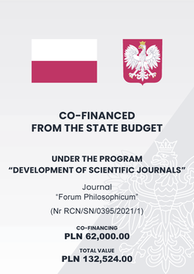- Home »
- Issues »
- 21/2 - Fall 2016 »
- Articles »
Iamblichus’ Response to Aristotle’s and Pseudo-Archytas’ Theories of Time
Abstract
This article aims to shed light on certain aspects of Iamblichus’ theory of time that have not been sufficiently examined to date in the scholarly literature. As of today, there are a mere handful of scholarly works tackling Iamblichus’ solutions to the paradoxes of time in particular, and his contribution to the developments of the Neoplatonic theory of the subject more generally. This article attempts to redress the lack of literature on this topic by examining Iamblichus’ response to Aristotle’s and Pseudo-Archytas’ theories of time. It begins with a brief survey of the philosophical developments that led to and were formative for Iamblichus’ philosophical explorations of the area in question. Then it moves on to provide a detailed account of Iamblichus’ own unique and puzzling theory of time. The author applies the method of comparative analysis, scrutinizing Iamblichus’ solution to the paradoxes of time against the backdrop of Aristotle’s and Pseudo-Archytas’ theories. The author identifies firm scholarly grounds for doing so from within the tradition of Iamblichus studies initiated by the ground-breaking research of Shmuel Sambursky and Salomon Pines and continued, inter alia, in the subtly nuanced analysis of Richard Sorabji and John Dillon. The author concludes that Iamblichus successfully resolved the paradoxes of time and that his conception lent itself to a more effective highlighting of the ordering function of time.
Keywords
Cite this article
Trostyanskiy, Sergey. “Iamblichus’ Response to Aristotle’s and Pseudo-Archytas’ Theories of Time.” Forum Philosophicum 21, no. 2 (2016): 187–213. doi:10.35765/forphil.2016.2102.11.
Bibliography
Aristotle. On Generation and Corruption. Edited and translated by Charles Mugler. In De la génération et de la corruption, 1–74. Collection des universités de France. Série grecque 444. Paris: Les Belles Lettres, 1966. Aristotle. Physics. Edited by William D. Ross. In Aristotelis Physica, corrected edition. Scriptorum classicorum bibliotheca Oxoniensis. Oxford: Clarendon Press, 1966. Armstrong, Arthur H. “Eternity, Life, and Movement in Plotinus’ Accounts of nous.” In Le néoplatonisme: [Actes du Colloque de] Royaumont, 9– 13 juin 1969, 67–76. Colloques internationaux du Centre national de la recherche scientifique. Sciences humaines. Paris: Éditions du Centre National de la Recherche Scientifique, 1971. Bowin, John. “Aristotle on the Order and Direction of Time.” Apeiron 42, no. 1 (2009): 33–62. doi:10.1515/apeiron.2009.42.1.33. Coope, Ursula C. M. Time for Aristotle: Physics IV. 10–14. Oxford Aristotle Studies 2. Oxford: Clarendon Press, 2005. Dillon, John M. “Iamblichus’ noera theōria of Aristotle’s Categories.” In “Iamblichus: The Philosopher,” edited by Henry J. Blumenthal and John F. Finamore, special issue, Syllecta Classica 8 (1997): 65–77. doi:10.1353/syl.1997.0013. Gersh, Stephen E. Kinēsis akinētos: A Study of Spiritual Motion in the Philosophy of Proclus. Philosophia antiqua 26. Leiden: Brill, 1973. Iamblichus. Iamblichi Chalcidensis in Platonis dialogos commentariorum fragmenta. Edited and translated by John M. Dillon. Revised second edition. Platonic Texts and Translations 1. Dilton Marsh, Wiltshire: The Prometheus Trust, 2009. Klitenic Wear, Sarah. “Syrianus the Platonist on Eternity and Time.” Classical Quarterly, new series, 58, no. 2 (2008): 648–60. doi:10.1017/ s0009838808000694. Manchester, Peter. The Syntax of Time: The Phenomenology of Time in Greek Physics and Speculative Logic from Iamblichus to Anaximander. Ancient Mediterranean and Medieval Texts and Contexts. Studies in Platonism, Neoplatonism, and the Platonic Tradition 2. Leiden: Brill, 2005. Proclus. The Elements of Theology. Edited and translated by Eric R. Dodds. 2nd, revised ed. Oxford: Clarendon Press, 1963. Pseudo-Archytas. Fragments. Edited by Holger Thesleff. In Holger Thesleff, The Pythagorean Τexts of the Hellenistic Period, 3–48. Acta Academiae Aboensis. Series A, Humaniora 30, no. 1. Åbo: Åbo Akademi, 1965. Sambursky, Shmuel and Salomon Pines. The Concept of Time in Late Neoplatonism: Texts with Translation, Introduction, and Notes. Jerusalem: Israel Academy of Sciences and Humanities, Section of Humanities, 1971. Simplicius. On Aristotle, Categories 9–15. Edited and translated by Richard Gaskin. The Ancient Commentators on Aristotle. London: Duckworth, 2000. Sorabji, Richard. Time, Creation, and the Continuum. Ithaca, NY: Cornell University Press, 1983.




